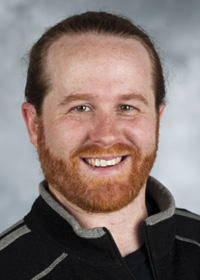Sarah Shadburne
Arts & Features
[email protected]
In times divided by politics, the environment often gets caught in the crosshairs then dropped off and forgotten, but the world exists in sound: birds chirping, leaves crunching, wind blowing and raindrops dripping. Music plays an incredible role in our perceptions of the world and for UNC Asheville Assistant Professor of Music and Jazz Scholar Bill Bares, this role motivates his academic and personal trajectories.

“Being able to express yourself eloquently and sensitively in the surroundings of other people doing the same thing, is profoundly democratic and political,” Bares said. “At its best, jazz is an embodiment of the best kind of democratic participation.’
A relatively new branch of music studies called ecomusicology deals explicitly with the intersections of music, culture and nature with consideration for musical and environmental issues, according to The Grove Dictionary of American Music.
In a recent talk given by Bares titled Jazz and the Sounds of Nature, he emphasized the connections between jazz and the natural world through music with ecological undercurrents, framing jazz as a response to lived environments.
“It’s a way to look at the world not literally, but imaginatively,” Bares said. “To jazz up a tune is to take something familiar and show all the freedoms and liberties you can take with what that is.”
Bares said conversations about ecomusicology surrounded virtually every genre except jazz, and that began to make him wonder.
“What is it about jazz that people don’t find particularly ecological?” Bares asked. “I think the answer is that it’s associated with urban environments.”
Bares said the history of jazz music could be a contributing factor to its alienation in ecomusical conversations, due to marginalization from the elite class which sought to other jazz musicians by likening them to the unpredictable nature of the environment.
“Whether it’s the country being a place of terror, or this idea somehow that African Americans are closer to the primitive — which has been part of the whole discourse for a long time — is something they’ve been trying to get away from. ”
Though historical context presents a challenge when trying to conceptualize jazz and nature, Bares said he believes this reason makes it a perfect platform for bringing issues to public awareness. Aaron S. Allen, director of environmental and sustainability studies at UNC Greensboro agrees that music is key to awareness.

“Ecomusicology can help us understand how music and sound are used in protest and building relationships in communities,” Allen said.
Allen describes the relationship between music and nature simply: there is none.
“Music is nature. There is no relationship because they are manifestations of the same sonic world of vibrations that connects everything,” Allen said. “However, music and sound can help us reflect on, engage with and understand the natural world in ways that create better relationships.”
Ecomusicology already plays a role in protest for environmental causes. James Smith, a 19-year-old student and member of the Divestment Coalition on campus, said there are several eco-protest songs they sing as a group, with titles such as “Rise Like the Water” and “Solid as a Rock.”
“Music is something that connects with people across any background or culture, so it’s something that can be very unifying. It has a pretty powerful role in organizing,” Smith said.
The Divestment Coalition seeks to end the use of fossil fuels on campus and fights for other environmental and social concerns such as sponsoring the National Day of Action.
“Especially in a time now when people are scared of Trump and what he’s doing, people can get behind helping their community and making change on an individual level,” Smith said.
Ecomusicology reflects on diversity, change and adaptability as important ecological characteristics, according to Allen.
“Our political culture is somewhat tone-deaf and I think that listening to the sounds of the environment is a cure for that tone-deafness,” Bares said. “Certain musicians and audiences are already listening to the environment in an enlightened way. Maybe that could percolate into our political culture. I think that would be a good thing.”


![Brooke Pedersen [second from the right] and Luis Reyes [right] hold banners during the Wrap The Woods event.](https://thebluebanner.net/wp-content/uploads/2025/09/ELIZABETH_PRITCHITT_IMG_3470-1200x804.jpg)
















